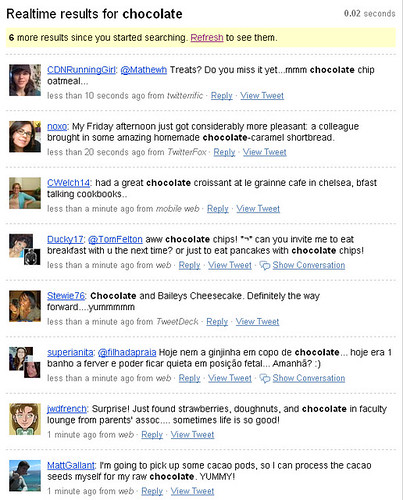 The folks over at BrandonHall, the learning folks who blog lots of interesting links, pointed out a value of Twitter that not all of us may have seen yet. Twitter as a search engine. This was interesting to me because I’m co-leading a short online workshop introducing social media in a global international development network. The question always comes up “why would we be interested in something like Twitter. One application I try to show is Twitter as social listening. But I never really conceptualized it as search. So I thought I’d put it to the test.
The folks over at BrandonHall, the learning folks who blog lots of interesting links, pointed out a value of Twitter that not all of us may have seen yet. Twitter as a search engine. This was interesting to me because I’m co-leading a short online workshop introducing social media in a global international development network. The question always comes up “why would we be interested in something like Twitter. One application I try to show is Twitter as social listening. But I never really conceptualized it as search. So I thought I’d put it to the test.
First, I searched for something for me. Chocolate, of course. But you have to have a question in mind to make the search meaningful beyond curiosity. I wanted to get a sense of how many people were tweeting about chocolate, and if their tweets were about their obsession, or if there was valuable information about chocolate flying around the tweetosphere. (Is that a word?)
Well, the answer is yes and yes. The first page of results were from tweets that happened within a two minute time frame. LOTS of volume. For example, flamingo_punk Wrote: “Mmmm! Chocolate mini-wheats rock my socks.” There were lots of passionate chocolate tweets like this. On the information side I found:
- SavingEveryday: Off to work! I leave you with this: An ounce of chocolate contains about 20 mg of caffeine…
- recr: @MortgageChick They say it takes 21 days for a ‘change’ to become a habit. try subing coffee or lattes with hot chocolate. worked for me.
- 2chaos: NYSE commentator: “If the last depression brought innovation, like thechocolate chip cookie, I hope this gives us more than the snuggie” Ha
- enviroknow: Yale E360: Climate Change Threatens Several Critical Archaeological Sites http://tinyurl.com/avwop8
- EnergyReport: SA to tackle climate change policy with ‘urgency’ – Deat – Creamer Media’s Engineering News: SA to tackle climat.. http://tinyurl.com/a63cel
- geostuff: earth science stuff Climate Change Hurting Hares: White Snowshoe Hares Can’t Hide On Brown Ea.. http://tinyurl.com/dlz2pj
- ktom17: Bay Area mayors challenge local biz, govt, and agencies to join forces against climate change & weakening economy http://tinyurl.com/aklsf4
- JoeFagundes: Climate change protester throws green custard over Mandelsonhttp://tinyurl.com/cjrsmm
- wdboer: Sarah Cummings blogs about a paper, “Linking international agricultural research knowledge with action for susta.. http://tinyurl.com/b8mxur
- wikirage1: The Indian Agricultural Research Institute (IARI) is the institute for advanced education in agriculture in India. http://bit.ly/19JDlM
- rachelstrohm: RT @wdboer Sarah Cummings blogs about “Linking internationalagricultural research knowledge with action.. http://tinyurl.com/b8mxur
- SustainableNews: Less Nitrogen Could Increase Profit, Sustainability – Agricultural Research http://ad.vu/ckpb
- KRyanJames: #tcot #sgp Stimulus: $176M for “deferred maintenance atAgricultural Research Service facilities”
P.S. Edited in later — some additional Twitter Search resources, thanks to all you fab commentors. I’ll keep coming back and editing them in.
- About a script to include twitter searches in a Google search l (script itself here)
- Tweetdeck